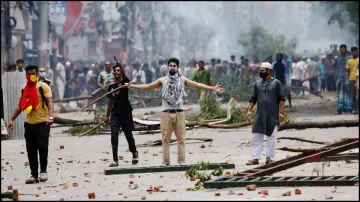Bangladesh imposes nationwide curfew as violent protests over govt jobs escalate, 105 killed | WATCH
Tensions dramatically increased in Bangladesh as protesters stormed a jail, set it ablaze and freed hundreds of inmates. The unprecedented crackdown on protests has killed more than 100 people and engulfed Sheikh Hasina's government in a crisis.

Dhaka: Bangladesh Prime Minister Sheikh Hasina's government imposed a nationwide curfew and ordered the deployment of military forces to maintain order after deadly clashes over the quota system in government jobs escalated on Friday as protesters stormed a jail in Narsingdi on Friday, freeing hundreds of inmates before setting the facility ablaze.
The announcement was made by Obaidul Quader, the general secretary of the ruling Awami League party, and came after police and security officials fired on protesters on Friday and banned all gatherings in the capital. The death count in days of violent protests across Bangladesh has now reached 105, as per media reports. Quader said the military was deployed to help the civilian administration keep order.
Police fired tear gas to scatter protesters in some areas as fire and smoke were visible from rooftops in the capital Dhaka. Three people were killed in the country on Friday as police cracked down on unrelenting student-led protests against government job quotas despite a ban on public gatherings, local media said.
Telecommunications were also disrupted and television news channels went off the air. Authorities had cut some mobile telephone services the previous day to try to quell the unrest. Bangladeshi media reported that train services had been suspended nationwide as protesters blocked roads and threw bricks at security officials.
Scenes of chaos, death in Bangladesh
The nationwide agitation, the biggest since Prime Minister Sheikh Hasina was reelected earlier this year, saw police and security officials firing bullets and tear gas at protesters while all gatherings were banned in the capital on Friday. On the previous day, protesters in Bangladesh set fire to several government buildings, including the headquarters of the state television network, trapping numerous individuals inside the blazing building.
Television news channels in Bangladesh were off the air and telecommunications were widely disrupted on Friday amid mostly deserted streets in Bangladesh on Friday following the violence seen on the previous day. According to outage monitor NetBlocks, Bangladesh was plunged into a "near-total" internet shutdown as night fell, with telephone and internet calls disrupted.
Furthermore, the official websites of the Bangladesh central bank, the prime minister's office and the police appeared to have been hacked by a group calling itself "THE R3SISTANC3". “Operation HuntDown, Stop Killing Students,” it said in identical messages on both sites, adding in bright red font: "It's not a protest anymore, it's a war now.”
The US Embassy in Dhaka said that reports indicated more than 40 deaths and "hundreds to possibly thousands" injured across Bangladesh. In a security alert, it said protests were spreading, with violent clashes being reported across Dhaka. The situation was "extremely volatile", it said.
Indian nationals 'safe and sound'
Meanwhile, the External Affairs Ministry said all Indians were safe and sound in violence-hit Bangladesh and are in touch with authorities to render any assistance. The Ministry also said the ongoing protests are an internal matter of Bangladesh. "All our Indian nationals are safe there. We have a large student community of 8,500 students, many of them pursue medical education in that country. They are all safe and sound, and they are in touch with our High Commission and with our Assistant High Commission as well," said ministry spokesperson Randhir Jaiswal.
There are 8,500 Indian students and 15,000 Indian nationals residing in Bangladesh. Jaiswal further said External Affairs Minister S Jaishankar is monitoring the situation and the high commission will be giving regular updates about the situation there. In an advisory, India urged its citizens in Bangladesh to minimise movement outside their residences.
Student organisations in New Delhi and Kolkata held solidarity marches in support of Bangladesh protesters. Some protesters were detained on their way to the Bangladesh High Commission in Kolkata and later released.
Why are people protesting in Bangladesh?
The nationwide agitation, the biggest since Hasina was re-elected earlier this year, has been fuelled by high youth unemployment. Protesters are demanding the state stop setting aside 30 per cent of government jobs for the families of people who fought in the 1971 war of independence from Pakistan. The demonstrations started last month after the High Court reinstated a quota system for government jobs, overturning a 2018 decision by Prime Minister Sheikh Hasina's government to scrap it.
The protesters have argued that the quota system is beneficial for supporters of Sheikh Hasina’s Awami League, which led the independence movement and called it a "discriminatory" move. Nearly 32 million young Bangladeshis are unemployed or without education out of a total population of 170 million people. Experts also attribute the unrest to stagnant job growth in the private sector, making public sector jobs, with their accompanying regular wage hikes and privileges, very attractive.
To make matters worse, Hasina refused to meet the students' demands and used the term 'razakar' (volunteers) - a term used for those who allegedly collaborated with the Pakistani army during the 1971 war that perpetrated some of the worst atrocities during the war. The protests turned violent this week following clashes between thousands of anti-quota demonstrators and members of the student wing of Hasina's Awami League party.
(with inputs from agencies)
ALSO READ | Bangladesh unrest escalates: Protesters set jail on fire, free hundreds of inmates